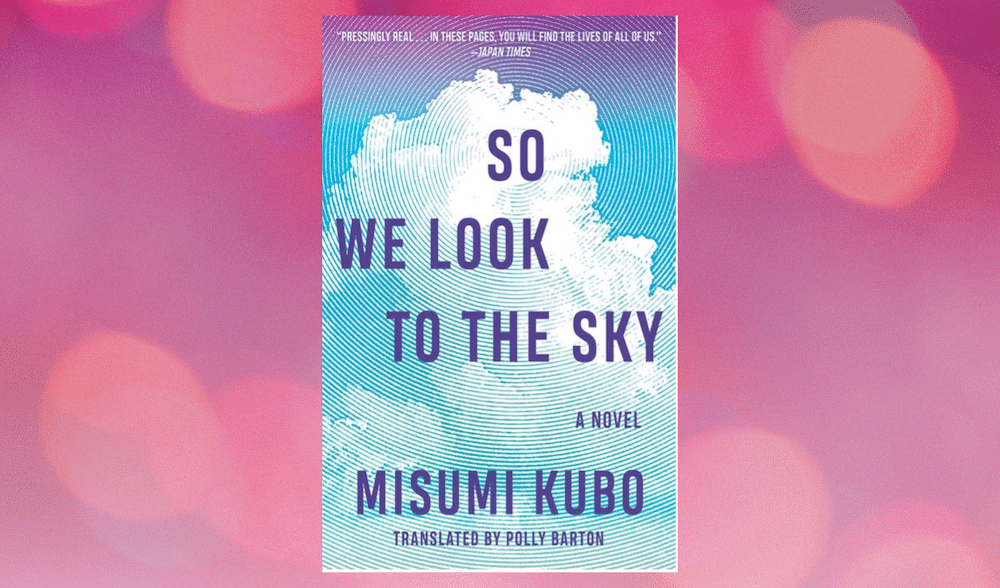ELLA KELLEHER WRITES — Is it possible that some relationships teeter on the edge of societal acceptance while others are too tame? Ranging from cosplay sex with an older, married woman to a couple that rarely touch each other, Misumi Kubo’s new novel explores five deeply intimate and intertwined stories that elucidate the peculiarities of the modern and seemingly ordinary human condition. Each individual tale immediately forces personal investment from the reader – instantly, you become entangled with the character as you read about individuals who make their first or last step toward a relationship.

So We Look To The Sky (2021) does not shy away from all aspects of what it means to be human, including sexuality. Kubo’s expertise precisely details the odd and heartfelt moments of sexual intimacy shared between the characters. Having won the R-18 Literary Award for erotic short fiction by new women writers for her story, Mikumari (2009), Kubo knows exactly how to wield sex scenes to her advantage. Polly Barton, the skilled translator of Kubo’s newest work, perfectly conveys what Kubo implies in her most explicit scenes: If actions speak louder than words, then one’s sexual desires reveals all that their language cannot.
Takumi, a high-school-age boy, meets Anzu at an anime convention, a cosplay-obsessed woman shackled within a loveless marriage to the equally strange Keiichiro. A deal is made. Takumi must sneak into Anzu’s apartment when Keiichiro is at work for the sole purpose of costumed and scripted sexual intercourse. The only problem is that Takumi finds himself utterly in love with the entirely average-looking, mediocre housewife. His preoccupation with Anzu begins to reveal itself while he’s at school, as a local girl who is madly infatuated with Takumi starts to take notice of his odd behavior and follows him on his nightly excursions. Keiichiro, less of a fool than the reader was led to believe, finds out about this scandalous affair, and leaks a series of videos he had secretly taken of his wife and her adolescent lover.
The affair brings Takumi’s small family a great deal of shame. Shame and its catalyst, gossip, seems to be among the major themes explored throughout Kubo’s writing. Ryota, Takumi’s close friend and classmate who lives in the projects on the outskirts of town, also encounters scandalous rumors that have the power to end a promising career and maybe even a life. Impoverished and left as the sole caretaker of his voracious and senile grandmother, Ryota is forced to work at a nearby convenience store controlled by a cruel, classist manager. Ryota’s coworker, a handsome yet mysterious man named Taoka, draws his cautious interest and begins to mentor him. Ryota had heard the awful stories floating around the convenience store, gossip surrounding Taoka’s unorthodox sexuality being tossed between old ladies shopping for bento lunches. He just didn’t expect it to be quite so sinister.

In a brief but telling explanation, Taoka says, “I never asked to be into that stuff, you know. The gods just kinda gave me those preferences.” Ryota later presses Taoka into explaining why he chooses to help the struggling boy both academically and, on occasion, financially. Taoka, tortured by his own demons, laments that “there’s parts of me that are unbelievably awful. So unless I make the other parts unbelievably good, I’m done for.” Humans are more than good and evil through Kubo’s eyes. Able to somewhat wriggle out of the suffocating clutches of shame’s grasp, even “bad” people can redeem themselves.
The narrative turns away from the young generation to focus on the mother of Takumi, middle-aged and burned out from Japan’s abysmal working hours and her son’s scandalous affair. After what seems like years spent alone, Takumi’s mother casts aside any hope for romance. Especially considering how her small town has condemned her as a “dirty woman” for operating a maternal clinic. After all, how could someone bring up a respectable young boy in a household of women constantly giving birth?
All seemed hopeless until a handsome doctor of Chinese medicine, Dr. Liu, begins to look after her when no one else would. When the world felt like it was crushing Takumi’s mother at a cruelly slow pace, Dr. Liu tells her that “If you can’t shake yourself free of a bad thing, then stay holding onto it. One day you’ll find it suddenly flipping, like a counter in that game Othello.” Life and all its egregious hardships, it seems, is perhaps just a matter of perspective.
Perspective, an idea that echoes throughout the pages, is exactly what Kubo’s characters need: a fresh start. The final line of the novel, “It seemed like Spring has come around again,” embraces the theme of rebirth through a renewed understanding of one’s circumstances. No matter a person’s position in life, whether they are victims of their disgraceful lust or smothered by the societal shame of womanhood – there is always hope for something better. This overarching message seems to be the glossy ribbon that gently ties together these painfully honest vignettes throughout Kubo’s tale of love and agony.

LMU English major graduate Ella Kelleher is the book review editor-in-chief and a contributing staff writer for Asia Media International. She majored in English with a concentration in multi-ethnic literature.


One Reply to “BOOK REVIEW: SO WE LOOK TO THE SKY BY MISUMI KUBO (2021)”